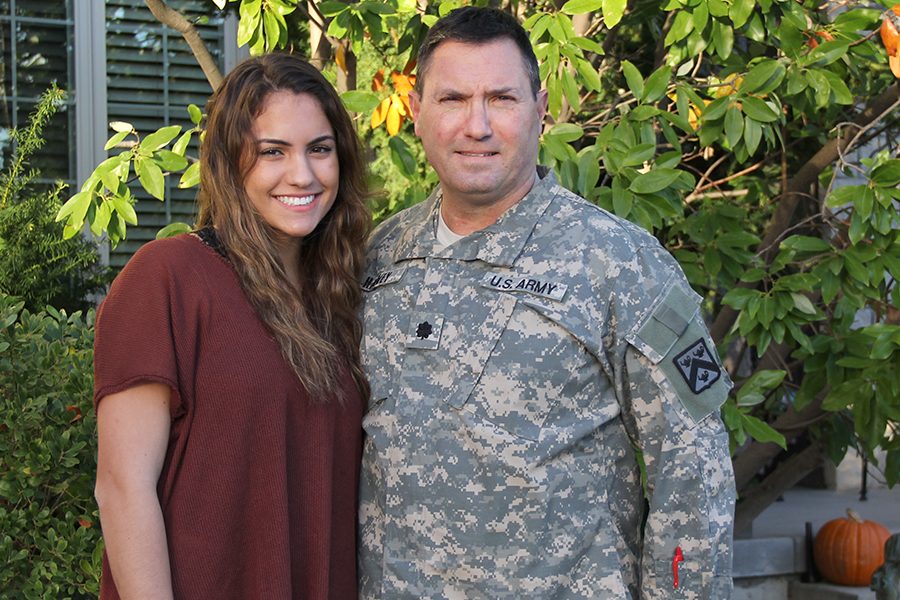Family members in the military affect students and their daily lives
Students describe the impact on families from frequent moves and deployments
November 15, 2017
Many students consider family an essential part of their lives, but due to special circumstances some students find the family dynamic to be different from the norm. Students with family members in the military often find that separation actually strengthens their relationship and can add to the amount of patriotism and respect the family has for the armed forces.
Senior Allie Harvey is familiar with this reality due to her father being in the military for 26 years and having retired last October. As a lieutenant colonel, he travelled approximately every other year and to multiple places such as Iraq, Germany and Korea.
“It was really hard because when he was first deployed in Iraq in 2005 I was still really young,” Harvey said. “I feel like it made our relationship stronger because I’d miss him, I’d want to tell him things, and I’d want to go out of my way to be there for him.”
 Sophomore Trinity Ouellette understands this struggle, seeing as her father has been in the military for 20 years and is currently deployed in South Korea. According to her, the emotional toll of his absence is a major stressor in her life.
Sophomore Trinity Ouellette understands this struggle, seeing as her father has been in the military for 20 years and is currently deployed in South Korea. According to her, the emotional toll of his absence is a major stressor in her life.
“He misses birthdays and Christmas; he’s missed over seven birthdays in my life and a lot of Christmases,” Ouellette said. “[The worst part is] it happens all of a sudden. You don’t know when they’re going to leave.”
Despite the difficulties, there are some benefits to having a family member in the military. Traveling has always been one of junior Ryan Williams’ favorite parts of growing up.
“I got to see a lot of the [United States], live in a lot of different places and experience many different things,” Williams said. “I feel like I’ve learned a lot, seen a lot and done a lot that the average person has not done.”
Moving may have provided Williams with new experiences, but it also took its toll on his ability to form relationships with his classmates.
“You never really had a solid group of friends because you’d live somewhere, and then you’d move, and then you’d live somewhere, and then you’d move again,” Williams said. “I grew up all over the United States, and it was a cool experience, but you also [never] had a good group of friends because it was always changing.”
 Ouellette, who has moved five times, agrees that constantly moving has its pros and cons.
Ouellette, who has moved five times, agrees that constantly moving has its pros and cons.
“It kind of sucks having to make new friends all of a sudden, all of the time, but I learned that I’m good at making friends, so that’s good,” Ouellette said. “I also get to start fresh, nobody knows anything about me yet.”
Having a parent be in the military has taken strong emotional and mental effects on Harvey, Williams and Ouellette, but according to senior Mitchell Dervin, the experience changes when a sibling, rather than a guardian, is in the military. His brother, Will Dervin, was recently deployed to Japan.
“My oldest brother is in the Air Force and the last time he came home it was for about two weeks,” Dervin said. “It hasn’t affected me a whole lot, other than not being able to see him. Although, we see him every now and then, so it ends up not being too bad. You just have to get used to him not being there.”
Despite past and present influences, the lives of their military family members has impacted the future of these students. To Ouellette, her father’s courage has pinpointed an aspiration that she will always maintain, even though she doesn’t necessarily want to serve like him.
“My dad helps people by serving the country, so I’ve always wanted to help people,” Ouellette said. “It’s influenced me a lot. I’ve considered [going into the military], but I don’t like the feeling of my dad not being there for me and if I have children, I wouldn’t want them to feel that way.”
Williams’ future is uncertain to him as he decides whether to follow his father’s model and pursue a military career.
“I’m thinking about going to the [United States Military Preparatory School] for college,” Williams said. “It’s always a consideration if I want to follow in his footsteps. I’m thinking about it.”
The adjustments made to not having a loved one there is different for each of these students, but they all agree it has provided difficulties. However, in the end distance has increased the strength of these family bonds and reuniting makes it all worth it.
“I was always crying when he came home because it was really exciting,” Harvey said. “I feel like as soon as he got back it was like he never left.”













